#fertility industry
Text
I've posted many times before about how surrogacy exploits vulnerable women and turns their babies into commodities. This article is about the impact of the fertility industry on the children themselves.
‘I slept with my half-sibling’: Woman’s horror story reflects loosely regulated nature of US fertility industry
By Rob Kuznia, Allison Gordon, Nelli Black and Kyung Lah, CNN | Photographs by Laura Oliverio, CNN
Published 10:00 AM EST, Wed February 14, 2024CNN —
Victoria Hill never quite understood how she could be so different from her father – in looks and in temperament. The 39-year-old licensed clinical social worker from suburban Connecticut used to joke that perhaps she was the mailman’s child.
Her joke eventually became no laughing matter. Worried about a health issue, and puzzled because neither of her parents had suffered any of the symptoms, Hill purchased a DNA testing kit from 23andMe a few years ago and sent her DNA to the genomics company.
What should have been a routine quest to learn more about herself turned into a shocking revelation that she had many more siblings than just the brother she grew up with – the count now stands at 22. Some of them reached out to her and dropped more bombshells: Hill’s biological father was not the man she grew up with but a fertility doctor who had been helping her mother conceive using donated sperm. That doctor, Burton Caldwell, a sibling told her, had used his own sperm to inseminate her mother, allegedly without her consent.
But the most devastating revelation came this summer, when Hill found out that one of her newly discovered siblings had been her high school boyfriend – one she says she easily could have married.
“I was traumatized by this,” Hill told CNN in an exclusive interview. “Now I’m looking at pictures of people thinking, well, if he could be my sibling, anybody could be my sibling.”
Hill’s story appears to represent one of the most extreme cases to date of fertility fraud in which fertility doctors have misled their female patients and their families by secretly using their own sperm instead of that of a donor. It also illustrates how the huge groups of siblings made possible in part by a lack of regulation can lead to a worst-case scenario coming to pass: accidental incest.
In this sense, say advocates of new laws criminalizing fertility fraud, Hill’s story is historic.
“This was the first time where we’ve had a confirmed case of someone actually dating, someone being intimate with someone who was their half-sibling,” said Jody Madeira, a law professor at Indiana University and an expert on fertility fraud.
A CNN investigation into fertility fraud nationwide found that most states, including Connecticut, have no laws against it. Victims of this form of deception face long odds in getting any kind of recourse, and doctors who are accused of it have an enormous advantage in court, meaning they rarely face consequences and, in some cases, have continued practicing, according to documents and interviews with fertility experts, lawmakers and several people fathered by sperm donors.
CNN also found that Hill’s romantic relationship with her half-brother wasn’t the only case in which she or other people in her newly discovered sibling group interacted with someone in their community who turned out to be a sibling.
At a time when do-it-yourself DNA kits are turning donor-conceived children into online sleuths about their own origins – and when this subset of the American population has reached an estimated one million people – Hill’s situation is a sign of the times. She is part of a larger groundswell of donor-conceived people who in recent years have sought to expose practices in the fertility industry they say have caused them distress: huge sibling pods, unethical doctors, unreachable biological fathers, a lack of information about their biological family’s medical history.
The movement has been the main driver in getting about a dozen new state laws passed over the past four years. Still, the legal landscape is patchy, and the US fertility industry is often referred to by critics as the “Wild West” for its dearth of regulation relative to other western countries.
“Nail salons are more regulated than the fertility industry,” said Eve Wiley, who traced her origins to fertility fraud and is a prominent advocate for new laws.
Accountability in short supply
More than 30 doctors around the country have been caught or accused of covertly using their own sperm to impregnate their patients, CNN has confirmed; advocates say they know of at least 80.
Accountability for the deception has been in short supply. The near-absence of laws criminalizing the practice of fertility fraud until recently means no doctors have yet been criminally charged for the behavior. In 2019, Indiana became the second state, more than 20 years after California, to pass a statute making fertility fraud a felony.
Even in civil cases that have been settled out of court, the affected families have typically signed non-disclosure agreements, effectively shielding the doctors from public scrutiny.
Meanwhile, some doctors who have been found out were allowed to keep their medical licenses.
In Kentucky, retired fertility doctor Marvin YussmanMarvin Yussman admitted using his own sperm to inseminate about half a dozen patients who at the time were unaware that he was the donor. One of them filed a complaint to the state’s board of medical licensure when her daughter – who was born in 1976 – learned Yussman was the likely father after submitting her DNA to Ancestry.com.
“I feel betrayed that Dr. Yussman knowingly deceived me and my husband about the origin of the sperm he injected into my body,” the woman wrote in a letter to the board in 2019. “Although I realize Dr. Yussman did not break any laws as such, I certainly feel his actions were unconscionable and depraved.”
In his response to the medical board, Yussman said that during that era, fresh sperm was prioritized over frozen sperm, meaning donors had to arrive on a schedule.
“On very rare occasions when the donor did not show and no frozen specimen was available, I used my own sperm if I otherwise would have been an appropriate donor: appropriate blood type, race, physical characteristics,” Yussman wrote.
He added some of his biological children have “expressed gratitude for their existence” to him and even sent him photos of their own children. Yussman, who noted in his defense that he didn’t remember the woman who made the complaint, said his policy decades ago was to inform patients that physicians could be among the possible donors, though neither he nor the complainant could provide records that clarified the protocol.
The board declined to discipline him, citing insufficient evidence, according to case documents. Reached on the phone by CNN, Yussman declined to comment.
The story that really put fertility fraud on the national radar was that of Dr. Donald Cline, who fathered at least 90 children in Indiana. Cline’s case spurred lawmakers to pass legislation that outlawed fertility fraud but wasn’t retroactive, meaning he was never prosecuted for it. But he was convicted of obstruction of justice after lying to investigators in the state attorney general’s office who briefly looked into the case. Following that conviction in 2018, Cline surrendered his license. Cline’s lawyer did not respond to an email seeking comment.
Netflix followed up with a documentary about Cline in 2022 that inspired two members of Congress – Reps. Stephanie Bice, an Oklahoma Republican, and Mikie Sherrill, a New Jersey Democrat – to coauthor the first federal bill outlawing fertility fraud. If passed, the Protecting Families from Fertility Fraud Act would establish a new federal sexual-assault crime for knowingly misrepresenting the nature or source of DNA used in assisted reproductive procedures and other fertility treatments. The bill has found dozens of backers – 28 Republicans and 20 Democrats – amid a renewed effort to push it on Capitol Hill.
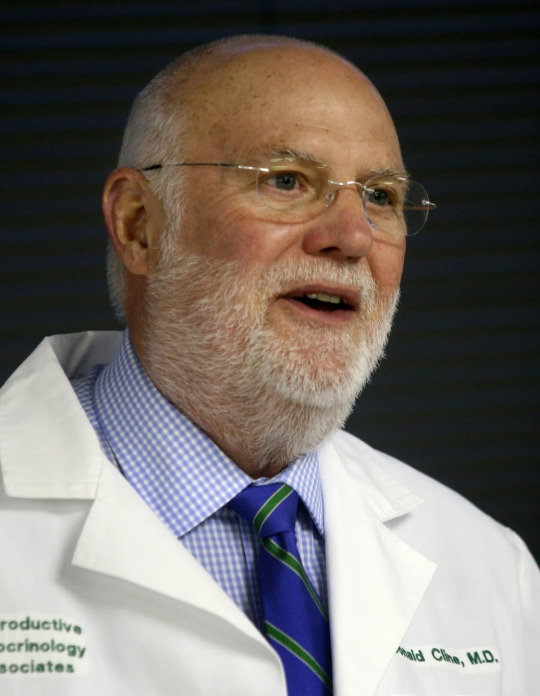
In this March 29, 2007 file photo, Dr. Donald Cline, a reproductive endocrinologist and fertility specialist, speaks at a news conference in Indianapolis.Kelly Wilkinson/The Indianapolis Star/AP/File
A group of advocates including Hill plans to go to DC to champion the bill on Wednesday.
To be sure, passage wouldn’t mean that any of the dozens of doctors who have already been accused of fertility fraud would go to prison, as the crime would have occurred before the law existed. But the measure would provide more pathways for civil litigation in such cases.
The push to better regulate the fertility industry isn’t without critics. It inspires unease – if not outright opposition – from some who fear any industry crackdown could have the unintended effect of making the formation of families less accessible to the LGBTQ community, which comprises an outsized share of the donor-recipient clientele.
“I think we should pause before creating additional criminal liability for people practicing reproductive medicine,” said Katherine L. Kraschel, assistant professor of law and health sciences at Northeastern University. “It gives me great pause … to say we want the government to try to step in and regulate what amounts to a reproductive choice.”
Some experts also point out that the advent of take-at-home DNA tests by companies such as 23andMe and Ancestry has pretty much stamped out fertility fraud in the modern era.
“To my knowledge, the majority of fertility fraud cases took place before 2000,” said Julia T. Woodward, a licensed clinical psychologist and associate professor in psychiatry and OBGYN in the Duke University Health System, in an email to CNN. “I think it is highly unlikely any person would engage in such practices today (it would be too easy to be exposed). So this part of the landscape has improved significantly.”
But activists in the donor-conceived community still want laws, in part to provide pathways for civil litigation, and also to send a message to any medical professional who might feel emboldened by the lack of accountability.
“Let’s say arguably that it doesn’t happen anymore,” said Laura High, a donor-conceived person and comedian who, with more than 600,000 followers on TikTok, has carved out something of a niche as a fertility-industry watchdog on social media. “Pass the f**king legislation just in case.
“Why not just out of the optics – just out of a, ‘Hey we’re going to stand by the victims.’ Let’s just do this. We know it’s never going to happen anymore, but let’s just make this illegal.”
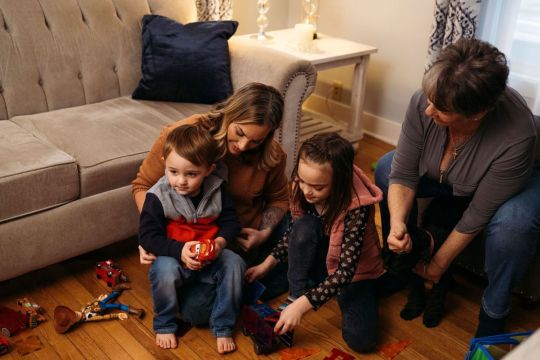
Victoria Hill and her two children play with toys in the living room of her mother's house in Wethersfield. Laura Oliverio/CNN
‘You are my sister’
The lack of a law in Connecticut appears to have been a stumbling block for a pair of siblings seeking recourse for what they allege is a case of fertility fraud.
The half-siblings – a sister and brother – sued OBGYN Narendra Tohan of New Britain in 2021, saying he deceived their mothers when using his own sperm in the fertility treatments.
He has derailed the suit with a novel defense, arguing successfully that it amounts to a “wrongful life” case, which typically pertains to people born with severe life-limiting conditions and isn’t recognized in Connecticut. Tohan, who is still practicing, did not return an email or call to his office seeking comment. The siblings are appealing the ruling.
Madeira, the expert in fertility fraud from Indiana University, called the “wrongful life” decision absurd.
“In fertility fraud, no parent is saying that – no parent is saying I would have gotten an abortion,” she said. “Every parent is saying, ‘I love my child. I just wish that my wishes would have been respected and my doctor wouldn’t have used his sperm.’”
And then there is Dr. Burton Caldwell, who declined CNN’s request for an interview. One of his apparent biological children decided to sue him last year, even though she knows it will be an uphill battle without a fertility fraud law on the books. Janine Pierson and her mother, Doreen Pierson, accuse Caldwell – who stopped practicing in the early 2000s – of impregnating Doreen with his own sperm after having falsely told her that the donor would be a Yale medical student.
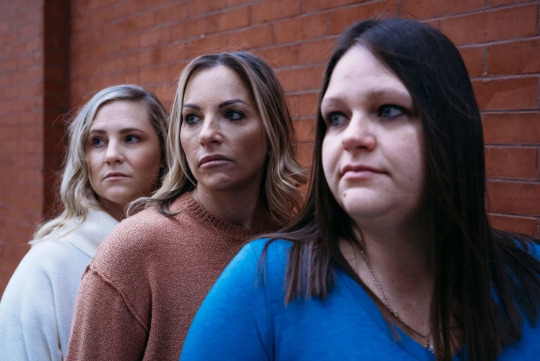
Half-sisters Alyssa Denniston, Victoria Hill and Janine Pierson pose for a portrait in Hartford, Connecticut. The three of them say they — and at least 20 others — all share a biological father, Dr. Burton Caldwell. Laura Oliverio/CNN
Janine Pierson, a social worker, thought she was an only child until she took a 23andMe test in the summer of 2022 and was floored to learn she had 19 siblings. (That number has since grown to 22.)
“It was like my entire life just came to this screeching halt,” she told CNN.
When she learned through one of her siblings that Caldwell was the likely father, Pierson said she immediately phoned her mom, who was stunned.
“We both just cried for a few minutes because it just felt like such a violation,” Pierson said.
Pierson said she decided to pursue the lawsuit even though she knows the lack of a fertility-fraud law in Connecticut could pose a challenge.
“It shouldn’t just be, you know, the Wild West where these doctors can just do whatever it is that they want,” she said.
Hill is watching her newly discovered half-sister’s case closely.
For her, the first surprise was learning the dad she grew up with wasn’t her biological father. Although her mom had told her when Hill was younger that she’d sought help conceiving at a fertility clinic, she also said – falsely – that the doctor had used her dad’s sperm.
When Hill learned that the biological father appeared to be Caldwell a few years ago, she contacted lawyers to inquire about filing a suit, but was told she doesn’t have much of a case, so she didn’t pursue it. Now, she said, her statute of limitations is about to expire.
Last year, Hill was hit with another shattering revelation.
In May, she and her three closest friends were celebrating their 20-year high school reunion over dinner.
She was sharing the tale with them of how she learned about her biological father. Everyone was captivated, except one person – her former boyfriend. He looked like he was turning something over in his head. Then he noted that his parents, too, had sought help conceiving from a fertility clinic.
A couple months later, in July, as Hill was leaving for a summer vacation with her husband and two young children, the ex-boyfriend texted her a screenshot showing their 23andMe connection.
“You are my sister,” he said.
Fertility industry regulations in US lax relative to other countries
Hill’s high school boyfriend isn’t the only person she knew in the community who turned out to be a sibling.
“I have slept with my half-sibling,” Hill said. “I went to elementary school with another.”
What’s more, Hill said, back in the early 2000s, she lived across the street from a deli in Norwalk she often went to that was owned by twins who she later learned are her siblings.
Pierson, too, discovered recently that she’d crossed paths with a sibling long ago. She said she has a group photo from when she was a kid at summer camp that shows her on a stage and a boy in the audience. In 2022, she learned that he is her older half-brother.
“Within 20 feet of one another, and we have no idea,” she said.
In general, the bigger the sibling pool, the greater the risk of accidental incest – regardless of whether fertility fraud came into play.
“I don’t date people my age. I can’t do it,” said Jamie LeRose, a 23-year-old singer from New Jersey who has at least 150 siblings from a regular sperm donor, not a doctor. “I look at people my age and I’m automatically unattracted to them because I just, I go, that could be my sibling.”
With this in mind, activists also often advocate for laws that cap the number of siblings per donor – and that do away with donor anonymity. (Neither of these restrictions are included in the proposed federal bill.)
Other countries have instituted such regulations. Norway for instance limits the number of children to eight; Germany, to 15. Germany and the UK have banished anonymity at sperm banks.
The United States government has no such requirements – and the professional association that represents the fertility industry wants to keep it that way.
“What we have not done very much in this country is pass regulations about who gets to have children,” said Sean Tipton, the chief advocacy and policy officer for the American Society for Reproductive Medicine. “If you’re going to say you should only be able to have 50 children, that’s fine. But that should apply to everybody. It shouldn’t apply just to sperm donors.”
Regarding the concern among donor-conceived people about accidental incest, Tipton added, “if you want to be sure that before you have children with somebody, you can run DNA tests to make sure you’re not related.”
The ASRM, which often clashes with donor-conceived activists, has not taken a stance on the federal bill, Tipton told CNN.
The organization does offer nonbinding guidelines that address concerns about incest, recommending for instance no more than 25 births per donor in a population of 800,000.
Although most of the donor-conceived people who spoke with CNN for this story said they wanted to see legislative change, they also described an emotional aspect of the topic that no new law or regulation could begin to quell: a yearning to better understand one’s origins and identity. For Pierson, it was this desire, coupled with a mix of anger and curiosity, that compelled her to pay Caldwell an unannounced visit one day in 2022 – weeks after she’d learned he was most likely her biological father.
Confronting Caldwell
“I woke up that day and I had decided I didn’t want to call him,” Pierson said. “I didn’t want to give him the opportunity to say no. So I just drove directly to his house from work.”
Pierson, who lived in Cheshire at the time, describes an experience that was equal parts surreal and awkward.
After an hourlong trip, she pulled up to a large, stately house with a long driveway not far from the Connecticut coast. When she knocked on the door, nobody answered. But when a neighbor stopped by to drop something off, Caldwell opened the door. Seizing the moment, Pierson introduced herself. He let her in.
Laying eyes for the first time on her biological father, Pierson, 36, saw a man in his 80s with a slight tremor due to Parkinson’s, sporting a blue golf shirt.
He invited her inside and they sat at his dining room table.
Caldwell, she said, didn’t seem surprised – likely because Hill had made a similar visit a couple of years earlier.
“He was not in any way apologetic,” Pierson said, but she added that he did not deny using his own sperm when working in the 1980s at a New Haven clinic. She said Caldwell confessed that he “never gave it the thought that he should have … that there would be so many (children), and that it would have any kind of an impact on us.”
Pierson said Caldwell asked her questions that gave her pause.
“One thing that really has always bothered me is that he asked me how many grandchildren he had,” she said. “And he was very curious about my scholastic achievements and what I made of myself. … Like how intelligent I was, basically.”
She said their conversation ended abruptly when, looking uncomfortable, Caldwell stood up, which she took as a signal that the visit was over. Before parting ways, she asked if he would pose for a photo with her. He consented.
“I knew it would be the only time that I actually ever had that opportunity to take a picture,” she said. “Not that I wanted like a relationship with him in any way because – it was just like mixed of emotions of, you know, like, I despise you, but at the same time, I’m grateful to be here.”
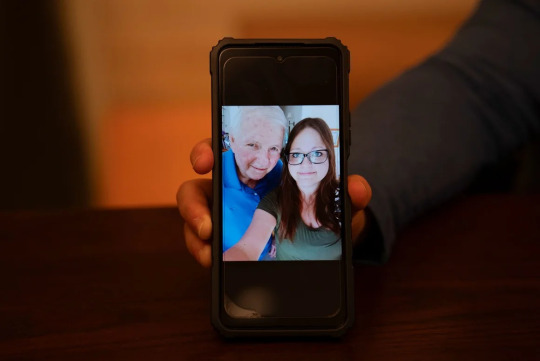
Janine Pierson displays a selfie she took with Caldwell on her phone in Hartford, Connecticut. Pierson took the photo during a visit with Caldwell in 2022 and it is the only photograph she has with him. Laura Oliverio/CNN
#usa#Fertility industry#Burton Caldwell#Fertility fraud#huge groups of siblings made possible in part by a lack of regulation#Accidental incest#Most states have no laws against fertility fraud#huge sibling pods#unethical doctors#unreachable biological fathers#a lack of information about their biological family’s medical history#Nail salons are more regulated than the fertility industry#At least 80 doctors have used their own sperm to impregnate their patients#Marvin Yussman#Dr. Donald Cline fathered at least 90 children#Protecting Families from Fertility Fraud Act still hasn't passed into law#wrongful life#OBGYN Narendra Tohan is still practicing#Large sibling pods in the same community#Norway limits the number of donor conceived children to eight#Germany limits donor conceived children to 15#Germany and the UK have banished anonymity at sperm banks
16 notes
·
View notes
Text
US appeals court kills ban on plastic containers contaminated with PFAS
Republicans absolutely do not give a fuck about your health so long as it affects profitability. They don't give la shit if a company produces a product that causes health problems.
Republicans will pretend to care about mothers and fertility with their anti-abortion bullshit whilst simultaneously allowing companies to pump fertility-destroying teratogenic compounds into their products.
#environmental protection agency#epa#texas#republicans#pfas#pfas pollution#plastic#plastic products#industry#fertility#miscarriage#abortion#republican hypocrisy#united states#capitalism#corporate greed#cancer#carcinogens
9 notes
·
View notes
Text
Me when doing my environmental science homework, at every available opportunity:
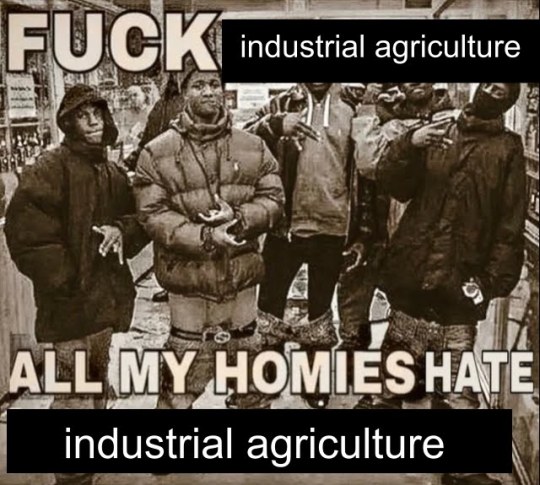
#wish there were a class discord or a chill teacher so i could share it#fr though I'm like “oh we're talking about freshwater? hey did you know that agricultural runoff is causing accelerated eutrophication?”#and that a lot of the runoff is bc of erosion caused by the destruction of ecosystems and their vegetation that would've kept soil in place#and the runoff is mostly compromised of fertilizer and bacteria and pesticides from the agriculture and sediment from the eroded land#and that crop irrigation is so inefficient that literally 40% of irrigation water never reaches the crops#and don't even get me started on the FUCKING CORN SUBSIDIES#god those fucking corn subsidies#“hey boudicca what's the worst policy choice the us government made in the 1930s–40s?”#“was it American isolationism? maybe increased militarization? the garbage treatment of women and minorities?”#wrong! it was not stopping those fucking corn subsidies#(this is a joke obviously those other things were worse)#(I'm not actually saying this silly little agricultural practice was worse than Japanese internment don't worry)#but i AM saying that at some point they should've fucking phased out those goddamn corn subsidies#do you wanna know why California grows so much corn even though it's an incredibly water intensive crop and California is dry as shit?#I'll give you three guesses#anyway sorry for rambling my point is fuck industrial agriculture#agriculture#described
9 notes
·
View notes
Link
A new nickname for DeSantis: Radiation Ronnie.
DeSantis’s rubber stamp legislature just sent him a bill authorizing the use of radioactive waste to pave Florida roads. Perhaps they want to give Mickey Mouse radiation poisoning at Disney World.
Roads in Florida could soon include phosphogypsum — a radioactive waste material from the fertilizer industry — under a bill lawmakers have sent to Gov. Ron DeSantis.
Conservation groups are urging DeSantis to veto the bill, saying phosphogypsum would hurt water quality and put road construction crews at a higher risk of cancer.
Why would DeSantis veto a bill from his own trained seals in the legislature? If he did, Trump might accuse him of caving to the “woke” environmentalists.
HB 1191 would compel the Florida Transportation Department to study using phosphogypsum in paving projects, calling for "demonstration projects using phosphogypsum in road construction aggregate material to determine its feasibility as a paving material."
[ ... ]
The bill sets a deadline of April 1, 2024, giving the transportation agency less than a year to complete its work and make a recommendation. The Republican-dominated Florida Legislature approved the measure by a wide margin.
This whole thing sounds poorly thought out and stupid. That makes it typical of Florida Republicans.
In fertilizer, phosphorus is important for plants to grow strong roots and for crops to be productive. Florida has been an important source since the 1800s; today, the EPA notes, "Florida alone accounts for approximately 80 percent of the current capacity, making it the world's largest phosphate producing area."
When phosphate rock is dissolved in sulfuric acid to make phosphoric acid for fertilizer and a few other uses, phosphogypsum is what's left over.
The commonly used production process, which dates to the 1840s, is not very efficient. For every ton of phosphoric acid produced, more than 5 tons of phosphogypsum waste is generated.
There is a problem in the state with the amount of phosphogypsum being produced. They just don’t know where to put it any more.
Florida's prominent role means the state also has massive waste sites called phosphogypsum stacks, or "gypstacks." Such stacks can be very large — spanning up to 800 acres and about 200 feet in height. They've been linked to serious problems over the years, due to sinkholes and other breaches.
So rather than rethink this whole process, Republicans want to get rid of it by paving the state with it.
"Phosphogypsum contains appreciable quantities of uranium and its decay products, such as radium-226," according to the EPA. And because the fertilizer production process concentrates waste material, "phosphogypsum is more radioactive than the original phosphate rock," the agency notes.
"The radium is of particular concern because it decays to form radon, a cancer-causing, radioactive gas," the EPA adds.
DeSantis can sign the bill, veto it, or let it become law without his signature.
DeSantis could sign the phosphogypsum road-test measure into law at any time; it he takes no action, the bill will be enacted automatically.
That last option gives him a way of claiming that he had nothing to do with the bill. But that would be disingenuous and would fool few people.
Having everybody know that Florida has radioactive roads probably wouldn’t do much for tourism.
#florida#ron desantis#radiation ron#fertilizer industry#phosphogypsum#paving roads#gypstacks#radon#radium-226#uranium#florida legislature#hb 1191#republicans#cancer-causing radioactive gas#epa
42 notes
·
View notes
Text
the doctor’s office just emailed me that the lab results were in but when I opened them all the numbers were exactly the same as the first blood draw which would be gutting news. then I looked at the date and realized they’d sent me the old labs by mistake and immediately burst into tears like WHY has this entire process been designed to produce maximum anxiety. then I had some back and forth with the doctor’s office and then they finally called me back and told me that they had forgotten to have the lab pick up the specimen so my blood has just been sitting in the pickup box at the clinic all fucking weekend and all the frantic compulsive checking I’ve been doing over the past 48 hours was for nothing. now I have to wait for the lab to pick up today’s order and run the tests. I think I could scream
#I am just sobbing and it’s purely an adrenaline reaction#this isn’t a big deal!!!!! it isn’t a big deal!!!!! and yet it’s like#it’s just been engineered to make me so stressed and miserable#I hate! the fucking! fertility industry!!!!! I hate how crazy it makes me feel!!!!#like I just spent the entire weekend totally unable to concentrate or feel normal for even a second because I’m so scared/stressed#that something is going to go terribly wrong in my body again#and it was just like#a careless oversight
13 notes
·
View notes
Text
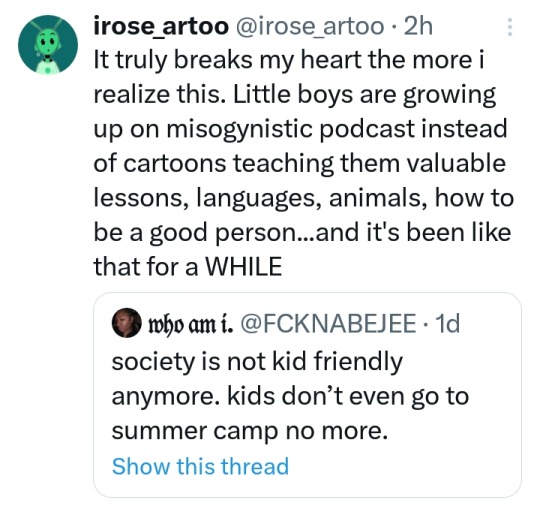
#kids#the internet#i am not blaming the kids nor the parents#parenting is hard enough especially these days and in fact fertility rates are gradually dropping#but the economy is shite and prices are going up#meanwhile the most obnoxious and destructive types of ideologies have taken to the online public/internet and are spreading their shite#to a lot of impressionable kids l#& the fact that the entertainment industry is STILL going to use AI on a lot of their shows meaning that quality for cartoons is declining#fuck capitalism
2 notes
·
View notes
Text
So I'm family planning and doing a bunch of research and a book and an entirely unrelated blog have both used "rainbow baby"/"rainbow family" to describe queer people having children. I'd never heard either phrase before but it seems like perhaps this is A Thing now. Personally I just fucking hate that term; it strikes me as so condescending and manufactured. And I told my sister just that and she's like..... hey wtf?? Rainbow baby is a euphemism for a baby that's died.
Anyway my baby is going to be a FUCKING BABY AND THAT'S IT.
#I hate the fertility industry#why can't I just pretend to be a man#and my wife and I go live on the edge of the woods away from town#and we're just a childless couple#and then some teen who got pregnant out of wedlock#or perhaps a fleeing princess#can just leave a baby on our doorstep#and then we have a baby#but no#gotta pay people who say shit like rainbow baby and think that makes them LGBTQ+ friendly 12 bajillion dollars#to maybe have a child#I will not stop ranting about this I'm sorry
2 notes
·
View notes
Text
“It's hard to live in the city” ordinance (February 10, 2003)

The Snow Country (Yasunari Kawabata)
(This is an entry for a contest sponsored by Snowy Village. I won a prize and received 5 kg of top-grade rice.)
(the purpose)
Article 1
The purpose of this practice is to awaken the urban population, who live separately from rural areas to the place of humans in nature.
(Promotion of rainwater storage)
Article 2
The rain in the city just flows away, and the city people do not use it. Regardless of the form, local governments subsidize urban residents to use rainwater as their 'own water source'. This will prevent the destruction of nature caused by the constructing of unnecessary dams.
(Promote recycling of manure)
Article 3
Because excrement from the buttocks and agricultural products that enter the mouth connects cities and rural areas, local governments are working to spread composting toilets that can efficiently recycle excrement instead of flush toilets. Subsidies will be provided to households that have adopted composting toilets. At the same time, we will develop a route to effectively reuse the compost produced.
(Promotion of participation in forest management)
Article 4
As is well known, Japan's forestry industry is on the verge of collapse. We need to draw more attention to domestic timber. Therefore, each season, urban municipalities jointly plan forestry-related events with rural villages and invite urban residents to participate. Participating city residents and local governments will split the costs. The timber will be transferred at a low price to participating city residents.
(Care for wild plants and edible wild plants)
Article 5
In order to improve the fact that the citizens of the city have not returned anything to the farming, mountain, and fishing villages, those who steal wild plants will be penalized according to this customary practice. (Detailed regulations) Those who enter the mountain to pick edible wild plants are asked to buy thank-you fertilizer for a fee and use it to care for the collected edible wild plants.
(Provisions regarding tobacco)
Article 6
Currently, only the bad aspects of tobacco are emphasized, and urban residents are unaware of the fact that tobacco can also be used for medicinal purposes, including as a hemostatic agent. Violation of manners is out of the question, and clauses that discriminate against smokers are not included. It is a “do nothing” clause. (In fact, the causal relationship between tobacco and cancer has not yet been proven.) In addition, without violating the law, research and development of products using herbs (such as Eyebright, Coltsfoot, etc.) that can be used as "medicinal tobacco" are encouraged. and farming and mountain villages.
(Finance)
Article 7
In principle, each business is self-supporting, but businesses with poor performance can be financed without interest from other businesses.
#“It's hard to live in the city” ordinance#rei morishita#urban population#rainwater#dam#composting toilets#forestry industry#thank-you fertilizer#Eyebright#medicinal tobacco
5 notes
·
View notes
Text
I normally post about how surrogacy exploits women but this is an example of how the business part of ivf exploits women. They took that couples money after promising careful screening of the soerm donors. Instead the mother was infected with an STI that would impact any future pregnancies, they lost one baby and the other will need life long care.
The state Supreme Court confronted philosophical questions about “wrongful birth” and the value of life Wednesday when the state asked the justices to reverse a $37 million verdict awarded to a family whose lives were upended by a tragically flawed artificial insemination procedure at UConn Health.
Jean-Marie Monroe-Lynch, her husband Aaron Lynch and their surviving son Joshua sued for malpractice after fertility specialists affiliated with the University of Connecticut’s medical center inseminated her with sperm from an anonymous donor infected with cytomegalovirus, or CMV, a common, sexually transmitted virus that has catastrophic effects on fetal development.
The procedure, a therapeutic donor insemination, succeeded in that the mother became pregnant with twins, a boy and girl. But she and the children were infected with CMV. One of the twins died and the other was born in January 2015 with a long list of devastating disabilities that will put him in need of constant, life-long care. The surviving twin, Joshua, cannot communicate or care for himself, has global developmental delays; suffers from cognitive, hearing and movement deficits; suffers from autism and seizures, and spends hours each day having nutrition pumped into his body through a tube.
In its appeal, the state is arguing, among other things, that the family’s suit was not based in the usual definition of malpractice but is rather what has become known as a wrongful life suit, a relatively new and controversial action against medical practitioners for failing to properly prevent the birth of children, such as Joshua, shown through prenatal examinations to have tragically debilitating conditions.
See rest of article
#usa#connecticut#Ivf#Wrongful birth#UConn Health#cytomegalovirus or CMV#Wrongful life suit#The fertility industry is just like another big business
9 notes
·
View notes
Note
I hate cities and the way we are encouraged to disconnect ourselves from where food comes from.
-Brought to you by me realising, after eating food for over 25 years, that plants don't just live in the soil. They eat the soil. This is why all my indoor plants die after 3-5 years: I never gave them more food.
I wholeheartedly agree.
Seeing a big inhabited area without gardens surrounding it, without fields of wheat and corn, immediately tells me something is off, it's not natural that for a whole community of people, food is being produced far away by other people, or machines, and the secret of how it's being done and with what resources, kept away from our eyes. We see it in grocery stores like it simply lives there.
Industry benefits from us not knowing or realizing how to grow food, or how much healthier and better food we can grow right where we are. It also doesn't want us to know that their practices are harmful for the animals, soil, native ecosystem, the climate, the farmers, and ultimately, us when we get to eat it. When growing food is a part of our life, food becomes something we are familiar with from the moment of its birth, and not only a consumer goods.
Back to the other thing you said - yeah you do need to fertilize your indoor plants sometimes! They do eat the soil, or rather, take away the nutrients and absorb them in order to grow. If you have some kitchen scraps you can make compost, or you can use your menstrual blood to feed them, or your own urine mixed with water! Alternate sources are to mix up some nettle and water and let it ferment in the sun for 10 day, same can be done with borage and some other native plants. Good luck!
39 notes
·
View notes
Photo

This Organic Eggshell Plant Fertilizer is packed with minerals and amino acids and helps regulate the pH levels of soil while also providing nutritional boosts to your plants.
8 notes
·
View notes
Text
”florida lawmakers want to use radioactive material to pave roads” excuse me?
#“florida’s fertilizer industry produces massive amounts of toxic waste” and they want to put it in roads?#the things that go on the ground and near water and homes?
1 note
·
View note
Text
Botany series fun fact number three?
The Haber process accounts for 25% of all nitrogen fixated annually. That means that *at least* one in every four nitrogen atoms in your body passed through an industrial nitrogen fixation facility.
#Botany#chemical engineering#Agriculture#Fertilizer#N2#Haber#Fixation#Industry#Chemistry#Human Impact#Nitrogen#Ammonia#fun facts#farming
2 notes
·
View notes
Text
it doesn't make sense to pay to store my three remaining donor vials until i'm ready to try getting pregnant again... it costs a LOT to store them for two years and i should just either trust that i can buy more vials from this donor when it's time OR be fine with using a different donor. it doesn't really matter if my kids are half siblings! i also don't even know for sure if i'm going to want/be able to to have a second kid! but idk just feel :( about it. i can't believe they charge so much to store a thing i've already purchased at a premium... this whole industry is truly such a racket.
#i have a dream of one day writing a book about the US fertility industry#and what a fucking scam it is#anyway i've done it i signed the form to refund the vials#of course i only get 50% back of the purchase price lollll. even though they will turn around and sell them for 100%
6 notes
·
View notes
Text
.
#i wonder if cattle bones would be any good for making crochet hooks?#the meat industry must have a bunch of extras lying around#unless they all get processed into fertilizer or something
2 notes
·
View notes
Text
I'm gonna go to the local plasma place this weekend ideally
I can donate twice a week, and that should help alleviate my car panic a little...
#i wish I could donate my uterus but I refuse to participate in the greater fertility industry its fucking evil#im talking with my parents after work and im gonna cry more and just. ask for help#im ashamed to ask for help
1 note
·
View note